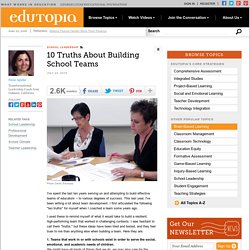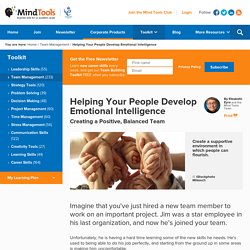

10 Truths About Building School Teams. I've spent the last ten years serving on and attempting to build effective teams of educators -- to various degrees of success.

This last year, I've been writing a lot about team development. I first articulated the following "ten truths" for myself when I coached a team some years ago. I used these to remind myself of what it would take to build a resilient, high-performing team that worked in challenging contexts. I was hesitant to call them "truths," but these ideas have been tried and tested, and they feel truer to me than anything else when building a team. 13396087260. 5 Alternatives to Think-Pair-Share for Classroom Discussion. Editors Note: Originally this blog featured five alternates to think-pair-share in classroom discussion.

But the post was so popular we've added five more ideas below! Enjoy! All learners need time to process new ideas and information. They especially need time to verbally make sense of and articulate their learning with a community of learners who are also engaged in the same experience and journey. In other words, kids need to talk!! Problem is, sometimes it’s hard to stay on subject without a little guidance. These five techniques (and a little purposeful planning) go beyond the traditional Turn and Talk/Think-Pair-Share to give students an opportunity to deepen their understanding while practicing their verbal skills. 1. Arrange students into pairs (teacher or student choice). 2. Students mix around the room silently as music plays in the background. 3. Teacher poses a question, sets a time limit and gives students a moment to think before writing. 4.
No, That Meeting Could Not Have Been an Email. We’ve all been there.

We’re sitting in back-to-back hour-long informational meetings. We try to sit attentively as waves of information are poured over us in report after report. Eventually, we realize the meeting is coming to a close and no decisions are being made. We’re bored, we’re tired, and we think: “This whole meeting could have been an email.” Not so fast. Organized Teachers, Organized Parents (video) Helping Your People Develop Emotional Intelligence - From Mind Tools. Creating a Positive, Balanced Team © iStockphotoMikosch Create a supportive environment in which people can flourish.

Imagine that you've just hired a new team member to work on an important project. Jim was a star employee in his last organization, and now he's joined your team. Unfortunately, he is having a hard time learning some of the new skills he needs. Instead of becoming irritated or shutting him out, your people step up and increase their efforts to support him. For some leaders, this situation might sound too good to be true. By focusing on increasing your people's emotional intelligence, you can reap many benefits from improved teamwork.
The Many Benefits of Emotional Intelligence Emotional Intelligence , also called EI, is partly the ability to recognize and control your own emotions, and understand what those emotions are telling you. Research suggests that there are many important benefits of EI. Building Emotional Intelligence Access the Full Article Learn More and Join Today. 6 Tips for Faculty Meetings Worth Going To. Laura Thomas , Director, Antioch University New England Center for School Renewal, Author of Facilitating Authentic Learning, Director of the Antioch Critical Skills Program; Elementary Library Media Specialist Posted 04/16/2015 5:12PM | Last Commented 07/10/2015 12:47PM Ask most teachers about faculty meetings and they'll describe a black hole of boring announcements, fruitless debate, and overwhelming agendas.

In short, most of us would rather fall on a fork than attend. But what if faculty meetings could actually inspire and engage? SRI Affiliate Application « School Reform Initiative. The secret ingredient that makes some teams better than others. Running a software company in Boston, I recognized — and my board told me — that we needed to reposition the business.

Our product was too bland, too generic to stimulate excitement or loyalty. I needed a team to help me, and I ended up working through the problem with a motley crew: a young web developer, a seasoned and eccentric media executive, a visual artist, and me. We spent a week in the private room of a burger joint, exploring options, rejecting easy answers, pushing one another to find something none of us could see. Looking back, I recall that intense period as one of the most thought-provoking learning experiences I’ve ever had. Data Reveals What Great Company Cultures Look Like — Namely. Right after Airbnb closed their Series C funding, the company cofounders invited Peter Thiel, who had just invested $150 million in them, to their offices to ask him for his biggest piece of advice.

He had one thing to say, albeit with a bit more choice wording: don’t mess up the culture. As the cofounders prepared to take their company through a period of aggressive growth, Brian Chesky wasn’t expecting to hear Peter Thiel say that culture should be their number one priority. So why did he tell them to put it front and center? When your company is growing fast, sometimes it feels like you can’t make a mistake. Revenues are rising, and the excitement of success keeps everyone working happily.
The magic of a small company is that strong cultures come more naturally to small groups of individuals working together closely. This is where the role of predictive analytics intersects with culture management. Elizabeth Lesser: Take "the Other" to lunch.